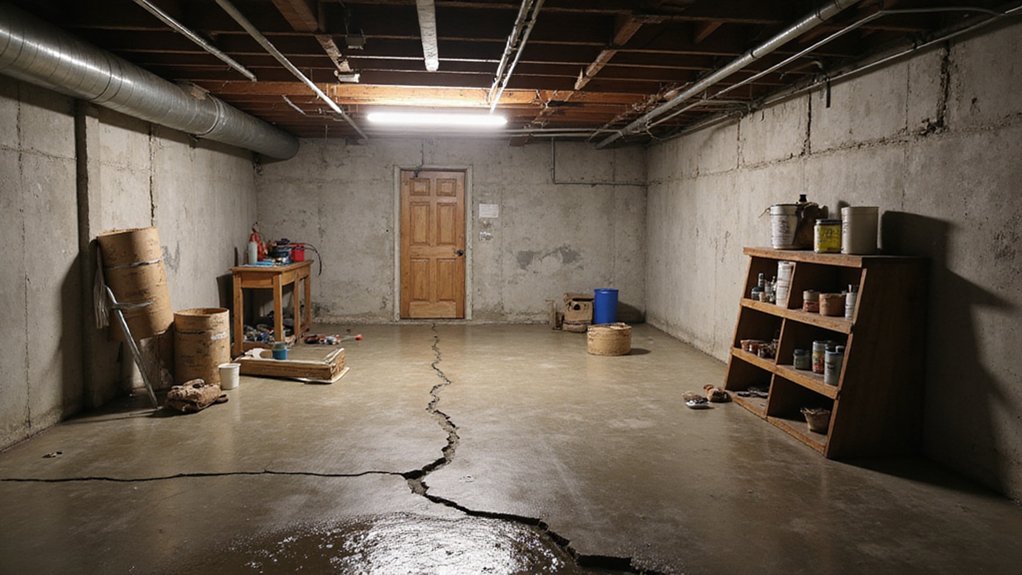As the spring rain season approaches, it’s imperative to verify your basement is ready to withstand the influx of moisture. Common causes of basement flooding, such as poor drainage and faulty window seals, can lead to expensive water damage if left unaddressed. Fortunately, there are several exterior and interior waterproofing strategies you can employ to protect your basement and maintain a dry, comfortable living space. By identifying and addressing potential problem areas early, you can take preventive measures to avert basement flooding and safeguard your home.
Common Causes of Basement Flooding
If your basement regularly floods, it’s likely due to one or more common causes. Poor grading around your home can direct water towards the basement instead of away from it. Ineffective downspouts that don’t properly channel water far enough from the foundation can also contribute to flooding. These issues allow water to accumulate near your home’s exterior, eventually seeping in through cracks or other openings. Water-damaged basement results in vulnerable infrastructure, mold, and damaged belongings.
Identifying Potential Problem Areas
Addressing potential problem areas is an essential first step in preventing basement flooding. Start by carefully inspecting your foundation, detecting any cracks or signs of deterioration. Don’t overlook those tricky window seals – check them thoroughly for any gaps or leaks. Regularly check for cracking, leaning, and settling to catch issues early.
Exterior Waterproofing Solutions
Once you’ve carefully inspected your foundation, it’s time to investigate exterior waterproofing solutions. Exterior waterproofing can effectively safeguard your home from water damage and flooding.
Consider these options:
- Exterior wall coatings: These specialized paints or sealants create a barrier against moisture, preventing water from seeping through your foundation.
- Below grade waterproofing: This involves applying a waterproof membrane or coating to the exterior of your foundation, below ground level, to obstruct water intrusion.
- Drainage systems: Installing perimeter drains, French drains, or sump pumps can efficiently channel water away from your home’s foundation.
- Grading and landscaping: Adjusting the soil slope around your home guarantees water flows away from the structure.
- Foundation repairs: Addressing cracks, holes, or other structural issues can stop water from entering your basement or crawl space.
Interior Waterproofing Strategies
Another effective way to protect your home from water intrusion is to investigate interior waterproofing strategies.
Installing a vapor barrier can create an impenetrable layer, preventing moisture from seeping in. Pair this with a dehumidifier to actively remove excess humidity, and you’ve got a powerful one-two punch against basement dampness. This combination works to keep your living spaces dry and comfortable.
Don’t let interior water issues ruin your home – take charge with these interior waterproofing techniques. You’ll enjoy the peace of mind that comes from a well-protected basement.
Basement Drainage System Upgrades
Upgrading your basement’s drainage system can make a significant difference in combating persistent dampness and water intrusion. Consider these basement drainage system upgrades:
- Installing a French drain to redirect waterflow and improve drainage around the foundation
- Replacing old or clogged drain tiles to amplify water removal from the basement
- Ensuring proper sloping and grading around the home to guide water away from the foundation
- Adding sump pumps or upgrading existing ones to actively pump out accumulated water
- Sealing cracks and gaps in the basement walls and floor to prevent water seepage
Sump Pump Maintenance and Replacement
If your basement has a sump pump, proper maintenance and timely replacement are essential to keeping it functioning effectively. Regularly check the sump pump for debris and test it by pouring water into the sump pit to verify it turns on and pumps water out.
Consider installing a backup power source, like a battery backup system, in case of power outages. Additionally, it’s wise to schedule a professional inspection every few years to identify any issues and guarantee the sump pump is operating at peak efficiency. Proactive maintenance can prevent costly basement flooding.
Addressing Existing Water Damage
Addressing existing water damage in your basement requires a thorough approach.
Identify and fix any structural cracks or openings that may be allowing water to seep in. This could involve applying a waterproof sealant or repairing the damaged areas.
Address any water stains or mold growth by thoroughly cleaning and disinfecting the affected surfaces.
Consider installing a dehumidifier to help regulate the moisture levels in your basement and prevent future water damage.
Guarantee proper drainage around your home’s foundation to direct water away from the basement.
Investigate the option of installing a sump pump system to actively remove any groundwater that accumulates.
Frequently Asked Questions
What Is the Cost of Basement Waterproofing?
The average basement waterproofing cost is $2,000 to $7,000, with a typical budget of $3,500 to $5,000. Don’t let a wet basement ruin your space – protect it for your family’s comfort and safety.
How Long Does Basement Waterproofing Last?
Properly installed basement waterproofing can last 10-15 years with regular maintenance. Quality materials and professional workmanship guarantee long-term protection, while routine inspections and repairs keep your home safe and dry.
Can I Do Basement Waterproofing Myself?
You can DIY basement waterproofing, but it’s a complex job. Hiring professional contractors is the safer bet for long-lasting results. They have the knowledge and tools to properly waterproof your basement and prevent future leaks.
How Often Should I Test My Sump Pump?
You should check your sump pump annually and monitor its operation regularly. This guarantees it’s working properly and can handle any incoming spring rain, keeping your basement dry and protected.
Does Homeowners Insurance Cover Basement Water Damage?
Homeowners insurance may cover basement water damage, but prevention through basement flooding prevention and basement moisture control is key. Check your policy carefully to understand your coverage and protect your home.


Recent Comments